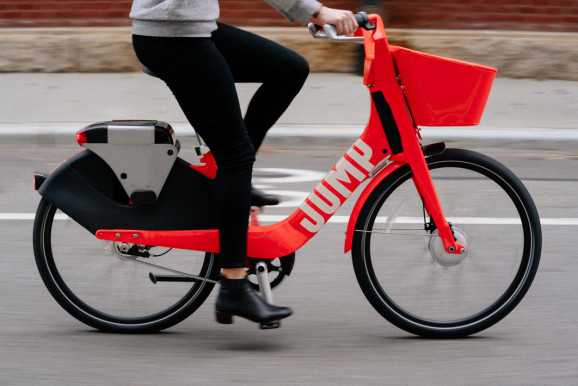If you follow urban cycling, you’ve probably heard the stories by now of dockless bikeshare (DoBi) chaos in parts of Asia, with bikes piling up on sidewalks and thrown in to rivers, and with companies going bankrupt almost overnight. Even in the U.S., the rollout has not gone well in some cities like Dallas where bikes are cluttering streets and sidewalks, with limited ridership.
On a recent visit to Seattle, I saw plenty of Lime and Ofo bikes scattered across the city. Most were parked respectfully on the edge of a sidewalk, often in groups of two to four. A few bikes blocked sidewalks while others were in homeless encampments, in the middle of forest preserves, and in other locations that would be difficult to access for would-be riders.
I think these parking and collection problems will wane over time as DoBi companies and cities use incentives/penalties to encourage responsible parking, and as riders learn.
What was most surprising to me was how few people I saw riding bikeshare despite the unusually nice March weather, and how limited the coverage seemed to be compared to Chicago, even though DoBi companies have deployed 9,400 bikes in Seattle compared to 5,800 “docked” Divvy bikes here. Granted, my observations were anecdotal, but they reinforce the belief among some transportation planners that we need a combination of DoBi and docked systems in cities like Chicago.
Which leads to the main question: can DoBi sustainably and equitably contribute to more and better bike share across Chicago and other cities without causing services to shrink, or only to be offered in more profitable areas?
If managed properly, DoBi systems could help fill in the gaps in Chicago’s bike sharing network and provide more access to bikes for all Chicagoans, in particular those who don’t have Divvy access. If done wrong, DoBi could undermine cycling in Chicago, similar to how Uber and Lyft are undermining public transit despite their assurances years ago that this wouldn’t happen.
Bikeshare is two-wheeled public transit. Relying on for-profit companies with venture capital investors to serve the public interest is a risky proposition absent good policy to direct these resources and their interplay with publicly-run systems like Divvy and CTA.
So how does Chicago get DoBi, and bikeshare more broadly, right?
Led by Jim Merrell, director of advocacy, Active Trans has provided input on the city’s development of dockless bike share policies. These recommendations were informed by a group of community leaders and intended to ensure future bike share services are developed in an inclusive and equitable way, and that both city policy and new bike share companies will sustainably contribute to more and better bike share across the entire city.
Active Trans’ recommendations for DoBi:
- Chicago’s dockless bikeshare program should begin on a pilot basis with a limited timeframe and limited geographic scope that includes underserved communities. Results from the pilot should be used to evaluate and revise the program.
- New providers should be required to coordinate with Chicago and secure required permits before launching.
- Bike share companies should pay for use of the public right-of-way as is the case in other cities, and that money should be used to address barriers to bicycling – particularly in communities with the highest need – including building new infrastructure as well as addressing safety, security, and cultural barriers to biking as transportation.
- The development of policies and programs should involve a broad based and inclusive community engagement process, including outreach to residents who do not currently bike or use bike share.
- Chicago’s program should include an equity coverage mechanism to ensure that good bikeshare options are available citywide. The mechanism should be created with input from local stakeholders and informed by what’s working and not working in other cities. The equity strategy should include Divvy and not be limited to new dockless services.
- Chicago should define bike access goals in general, and include docked, dockless and community based bike access programs – how are they supporting each and addressing inequity in bike access through these tools.
- Chicago should work with bike share vendors to identify specific community benefits, such as access to jobs related to dockless bike share for currently unemployed or underemployed residents or investment in community based programming.
- Chicago must ensure through outreach and education with the Chicago Police Department that dockless bike share does not create new opportunities for individuals to be harassed, targeted or criminalized.
- New bikeshare providers should meet national standards to ensure quality bikes and service, as established by the North American Bike Share Association.
- Bike share operators should be required to report data on metrics like ridership, where bikes are being parked, and trip origins and destinations. This data should be publicly available and used to inform the city’s long-term plans. Operators must be transparent about how they view their services developing over time, including how services will be offered equitably and sustainably in communities with the greatest need for increased transportation options.
Image Credit: JUMP Bikes

